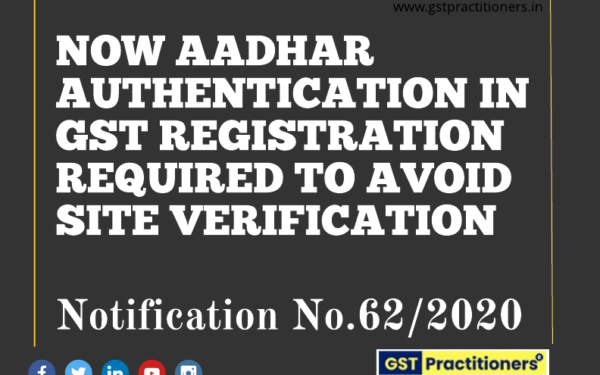Circular to clarify the procedure in respect of return of time expired drugs or medicines
Various representations have been received seeking clarification on the procedure to be followed in respect of return of time expired drugs or medicines under the GST laws. The issues raised in the said representations have been examined and to ensure uniformity in the implementation of the law across the field formations, the Board, in exercise of its powers conferred under section 168(1) of the Central Goods and Services Tax Act, 2017 (hereinafter
referred to as the “CGST Act”) hereby clarifies the issue in succeeding paragraphs.

2. The common trade practice in the pharmaceutical sector is that the drugs or medicines (hereinafter referred to as “goods”) are sold by the manufacturer to the wholesaler and by the wholesaler to the retailer on the basis of an invoice/bill of supply as case may be. It is significant to mention here that such goods have a defined life term which is normally referred to as the date of expiry. Such goods which have crossed their date of expiry are colloquially referred to as time expired goods and are returned back to the manufacturer, on account of expiry, through the supply chain.
3. It is clarified that the retailer/ wholesaler can follow either of the below mentioned procedures for the return of the time expired goods:
(A) Return of time expired goods to be treated as fresh supply:
a) In case the person returning the time expired goods is a registered person (other than a composition taxpayer), he may, at his option, return the said goods by treating it is as a fresh supply and thereby issuing an invoice for the same (hereinafter referred to as the, “return supply”). The value of the said goods as shown in the invoice on the basis of which the goods were supplied earlier may be taken as the value of such return supply. The wholesaler or manufacturer, as the case may be, who is the recipient of such return supply, shall be eligible to avail Input Tax Credit (hereinafter referred to as “ITC”) of the tax levied on the said return supply subject to the fulfilment of the conditions specified in Section 16 of the CGST Act.
b) In case the person returning the time expired goods is a composition taxpayer, he may return the said goods by issuing a bill of supply and pay tax at the rate applicable to a composition taxpayer. In this scenario there will not be any availability of ITC to the recipient of return supply.
c) In case the person returning the time expired goods is an unregistered person, he may return the said goods by issuing any commercial document without charging any tax on the
same.
d) Where the time expired goods which have been returned by the retailer/wholesaler are destroyed by the manufacturer, he/she is required to reverse the ITC availed on the return supply in terms of the provisions of clause (h) of sub-section (5) of section 17 of the CGST Act. It is pertinent to mention here that the ITC which is required to be reversed in such scenario is the ITC availed on the return supply and not the ITC that is attributable to the
manufacture of such time expired goods.
Illustration: Supposedly, manufacturer has availed ITC of Rs. 10/- at the time of manufacture of medicines valued at Rs. 100/-. At the time of return of such medicine on the account of expiry, the ITC available to the manufacturer on the basis of fresh invoice issued by wholesaler is Rs. 15/-. So, when the time expired goods are destroyed by the manufacturer he would be required to reverse ITC of Rs. 15/- and not of Rs. 10/-.
(B) Return of time expired goods by issuing Credit Note:
a) As per sub-section (1) of Section 34 of the CGST Act the supplier can issue a credit note where the goods are returned back by the recipient. Thus, the manufacturer or the wholesaler who has supplied the goods to the wholesaler or retailer, as the case may be, has the option to issue a credit note in relation to the time expired goods returned by the wholesaler or retailer, as the case may be. In such a scenario, the retailer or wholesaler may return the time expired goods by issuing a delivery challan. It may be noted that there is no time limit for the issuance of a credit note in the law except with regard to the adjustment of the tax liability in case of the credit notes issued prior to the month of September following the end of the financial year and those issued after it.
b) It may further be noted that if the credit note is issued within the time limit specified in sub-section (2) of section 34 of the CGST Act, the tax liability may be adjusted by the supplier, subject to the condition that the person returning the time expired goods has either not availed the ITC or if availed has reversed the ITC so availed against the goods being returned.
c) However, if the time limit specified in sub-section (2) of section 34 of the CGST Act has lapsed, a credit note may still be issued by the supplier for such return of goods but the tax liability cannot be adjusted by him in his hands. It may further be noted that in case time expired goods are returned beyond the time period specified in the sub section (2) of section 34 of the CGST Act and a credit note is issued consequently, there is no requirement to declare such credit note on the common portal by the supplier (i.e. by the person who has issued the credit note) as tax liability cannot be adjusted in this case.
d) Further, where the time expired goods, which have been returned by the retailer/wholesaler, are destroyed by the manufacturer, he/she is required to reverse the ITC attributable to the manufacture of such goods, in terms of the provisions of clause (h) of subsection
(5) of section 17 of the CGST Act. This has been illustrated in table below:
[table id=14 /]
3. It may be noted that though this circular discusses the scenarios in relation to return of goods on account of expiry of the same, it may be applicable to such other scenarios where the goods are returned on account of reasons other than the one detailed above.
4. It is requested that suitable trade notices may be issued to publicize the contents of this Circular.
5. Difficulty if any, in the implementation of this Circular may be brought to the notice of the Board. Hindi version will follow.

K.C.MAHATO is expert in GST Consultancy and has an experience of more than 10 years in Indirect tax , Direct Taxes and the accounting profession. He is also giving GST Practical Training to Students and SME Traders. He provide services that most effectively meet client needs. Her experience is concentrated in performing GST Laws & Practices and compliances of gst in a variety of industries.






